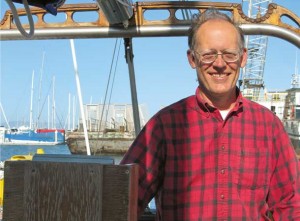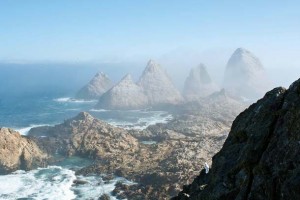Ellie Cohen became president and CEO of what is now PRBO Conservation Science in 1999. Under her leadership, the organization has grown from the local Point Reyes Bird Observatory, founded in 1965, to a hemisphere-scale operation, conducting bird-focused applied ecosystem studies on land and at sea. PRBO uses its wealth of data and partnerships to assess and reduce the impacts of changes in climate and land use on ecosystem health.
BN: Was there a defining moment when you were a kid that made you curious about nature?
EC: I grew up in a suburb of Baltimore on a street called Forest Garden Avenue, where the forest was gone. I can remember playing in the grass and watching the ants crawling around. I always loved the concept of ecology, the interrelatedness of everything, before I even knew what ecology was. I went to a private Jewish school where we had no biology. When I finally got to public school and took a biology class in seventh grade, I was so excited. It was then that I knew (or so I thought) my life’s calling–to bring the Russians and Americans together through our common love of nature.
BN: You went from forestry in college to butterflies and beyond before landing at PRBO. Tell us about that journey.
EC: I came to California to do fieldwork in butterfly ecology and was accepted to the Ph.D. ecology program at UC Davis. But that spring, in 1979, the Three Mile Island nuclear accident happened. Combining that with my experience traveling in Brazil earlier that year and seeing poverty on a scale I’d never seen before, I questioned if I should be studying butterflies. That took me on another path doing political and environmental work, and then getting a master’s in public policy. I ran a fundraising company for progressive nonprofits because a dear friend who was dying of leukemia had asked me to help for three months. I wound up staying for five years. That was in the mid-1990s. I realized that what I really wanted to do was to work at that nexus between conservation science and policy, where I could help ensure that science wasn’t sitting on bookshelves gathering dust but was instead really making a difference.
BN: How does bird-centric conservation work?
EC: Birds are great indicators. They can tell us about fisheries management and salmon return rates; they can tell us about pollution like pelicans told us about the dangers of DDT in the ’60s and ’70s; and birds can tell us about climate change and habitat loss.
BN: What motivated you to become an early and outspoken advocate for action on climate change?
EC: I believe in standing up for what’s right. From when I was a little kid, that’s what I was taught.
BN: How do you manage doing both scientific research and climate change advocacy?
EC: At PRBO we only take policy positions based on our science, on the scientific literature or expert opinion. Otherwise it would undermine our credibility. Today, the body of evidence is so enormous on climate change that it’s a powerful place to be–to represent the science and to simply communicate the facts.
BN: How is the Bay Area doing in terms of understanding and preparing for climate change?
EC: I give us a C-minus. Truthfully, relative to the rest of the world, maybe I’m being too harsh. There are some fabulous things going on in the Bay Area that have to do more with mitigation–reduction of greenhouse gas emissions. But adaptation is how we make do in a climate-changed world with the least damage. California climate change law deals almost exclusively with mitigation. My goal has been to promote nature-based solutions, making ecosystem conservation a priority equal to greenhouse gas reduction. Even if we stopped all of our carbon pollution today, we still rely on clean air and clean water, and food and fiber and pollination and all of the other things we get from nature to survive–whether we live in San Francisco or in the Amazon.
BN: Favorite bird?
EC: I love all birds, anything that flies. There’s something about freedom that the flight of birds inspires in me. I also love the perspective of a soaring bird–seeing the big picture with an eye for detail. A red-tailed hawk!
Learn more at prbo.org.

.jpg)
-300x221.jpg)


-300x200.jpg)